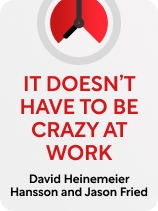
What are the effects of unhealthy work environments? How does incessant growth end up hurting a business?
In It Doesn’t Have to Be Crazy at Work, Jason Fried and David Heinemeier Hansson contend that many organizations perpetuate the unhealthy ideals of “hustle culture” by setting aggressive quarterly growth targets. However, these growth-oriented targets degrade employees’ quality of life.
Let’s look at the three downsides of aggressive organizational growth.
Downside #1: Growth Targets Are Demoralizing
First, Fried and Hansson say that one of the effects of unhealthy work environments is that they demoralize employees by constantly moving the goalposts of what constitutes well-done work. As soon as the company achieves one arbitrary goal, it starts working toward the next one. This means that no matter how hard they work, employees can never feel relaxed or satisfied because there are always new targets requiring them to do better.
(Shortform note: Arguably, the problem with constantly rising goals for your employees isn’t unreachable expectations, but the threat of punishment from upper management if those expectations aren’t met—for instance, demotion or termination. In a TED talk, Simon Sinek states that the trust and cooperation team members need to be productive disappears when employees fear their leaders. Through this lens, a system of constantly rising growth targets could be motivating as long as employees believe that their leaders will support them if they fail to reach those targets.)
Downside #2: Growth Targets Create Financial Stress
Second, Fried and Hansson assert that aggressive growth targets put the whole company under financial stress, which puts every employee under emotional stress. Many startups spend far more money than they earn on expanding business as quickly as possible—intending to sacrifice short-term profits for long-term revenue growth. However, this strategy pressures the team to execute perfect work; if the company doesn’t hit its growth targets, it goes bankrupt. This pressure will cause your employees to quickly burn out.
| Network-Based Products Profit From Aggressive Growth Although Fried and Hansson argue that pursuing hyperaggressive growth creates unnecessary stress, you may want to consider temporarily using this strategy if your product or service gets its value from the network effect. This is when products or services require a certain number of users to function properly and become more valuable as more users join, like a social media platform or online marketplace. If you create a network-based product or service, every dollar you spend on growth also makes your product or service more valuable, arguably making hyperaggressive growth strategies worthwhile. Andrew Chen asserts in The Cold Start Problem that once you attain a certain number of users, a network-based product or service will hit a tipping point. This is when your product or service has become valuable enough that it can attract users and grow into a market leader on its own, allowing you to scale back your spending on growth. After you hit this point, the outsized profits you’ll earn will hopefully ease the pressure on your team, preventing stress and burnout. |
Downside #3: Growth Targets Encourage Unethical Behavior
Finally, when companies make it their primary goal to hit growth targets, everyone on the team is more likely to break their promises to the customer and compromise their moral integrity to succeed. For example, in 2016, employees of the bank Wells Fargo who were under pressure to hit certain sales goals opened millions of fraudulent accounts under their customers’ names.
(Shortform note: Large organizations may be particularly susceptible to moral failings because layers of bureaucracy often separate decision-makers from the consequences of their decisions. As Nassim Nicholas Taleb contends in Skin in the Game, the more a decision-maker is distanced from the consequences of their actions (in both time and space), the less likely it is that their unethical actions will be noticed or punished—and the more they’ll be tempted to act unethically.)

———End of Preview———
Like what you just read? Read the rest of the world's best book summary and analysis of David Heinemeier Hansson and Jason Fried's "It Doesn't Have to Be Crazy at Work" at Shortform.
Here's what you'll find in our full It Doesn't Have to Be Crazy at Work summary:
- How today's "hustle culture" ruins the lives of many
- How you can establish more reasonable and sustainable goals
- The three qualifications to look for when scouting for any potential hire






